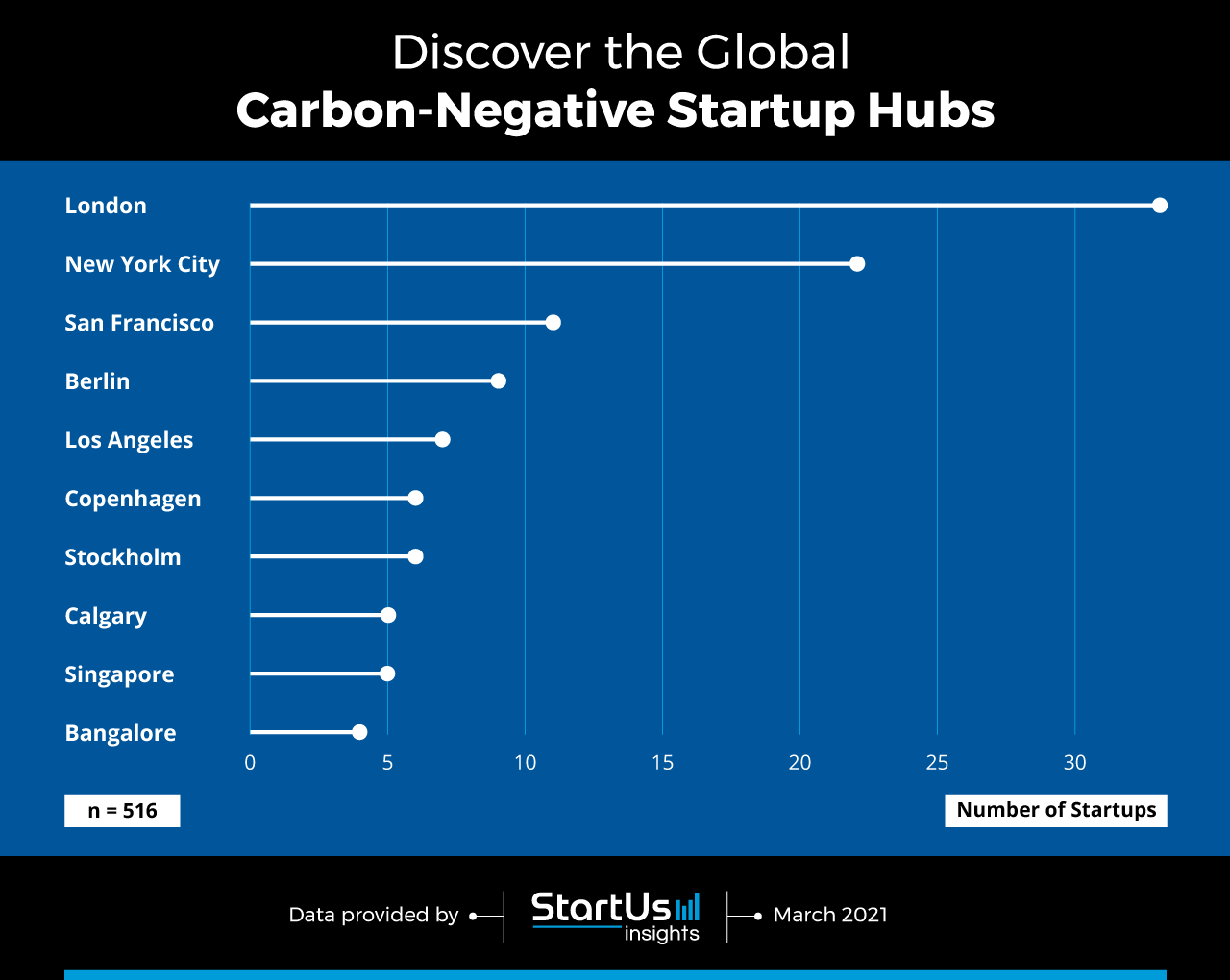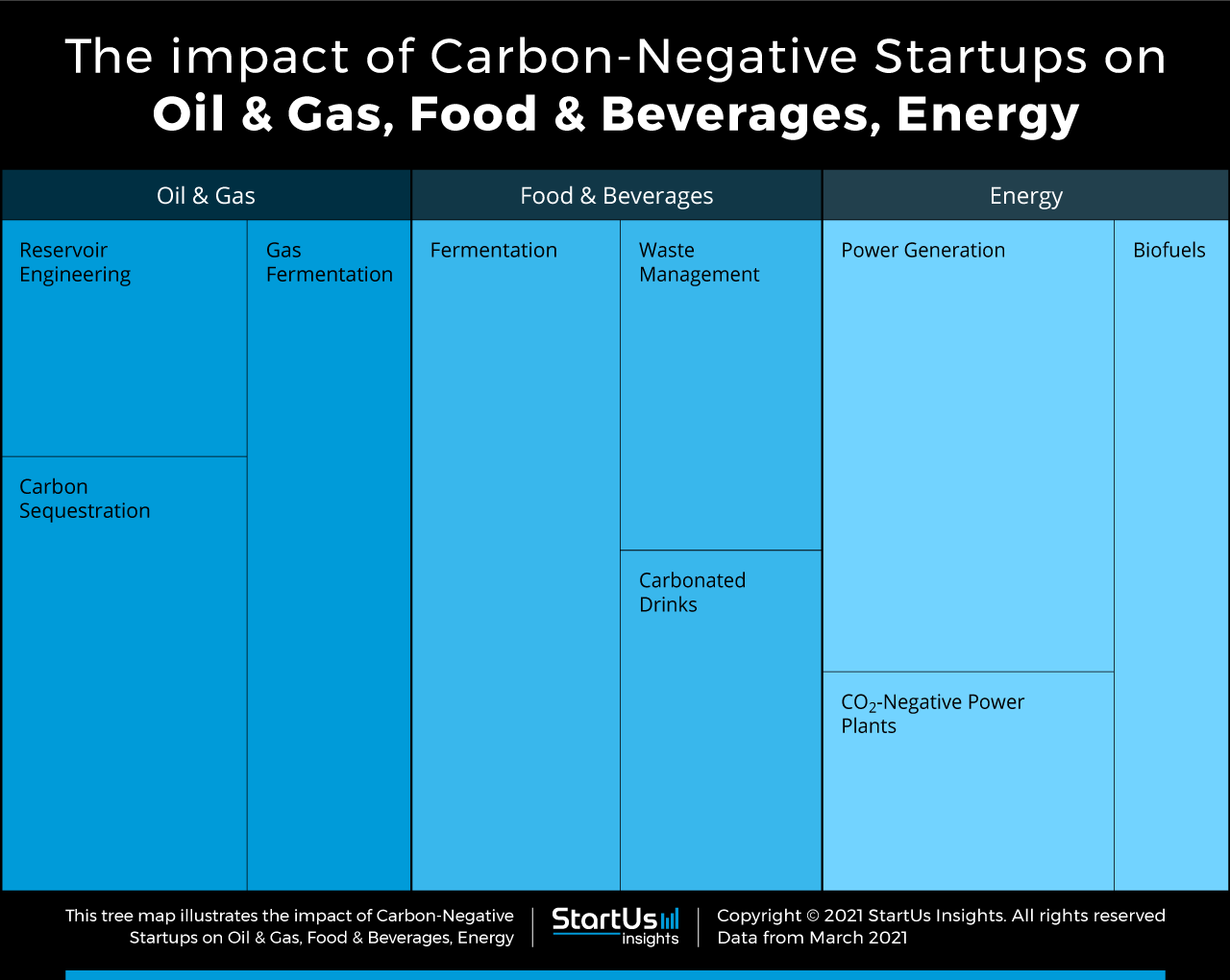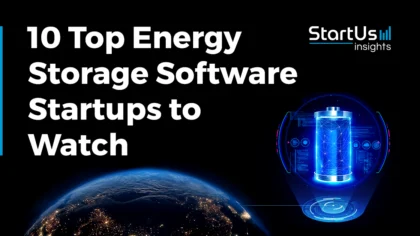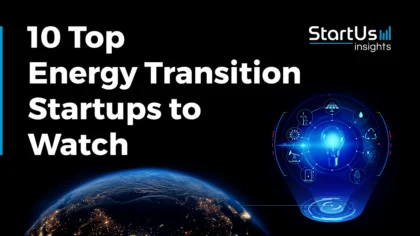Accelerate Productivity in 2025
Reignite Growth Despite the Global Slowdown
As humanity keeps increasing the atmospheric pollution with carbon dioxide, and other greenhouse gasses (GHGs), environmentalists and governments are looking for solutions to prevent the increase of CO2 from reaching the levels harmful to ecosystems, coastlines, and human health. Viable carbon mitigation techniques used today encompass emissions reduction approaches such as renewable energy and alternative fuels, geoengineering practices such as stratospheric aerosol injection and cirrus cloud thinning, and carbon dioxide removal, storage, and utilization methods.
The carbon removed from the atmosphere can be either stored underground or further utilized in fuel production or for carbonated drinks, contributing to the sustainable development of various industries. You get to explore more solutions in this report that leverages the Big Data & Artificial Intelligence (AI)-powered StartUs Insights Discovery Platform, covering 1.3 million startups & scaleups globally. This provides you with data-driven innovation intelligence into the countries and cities hosting the most carbon-negative startups, the leading industries in carbon dioxide utilization, common applications of carbon-negative technologies, and average startup funding in the field.
Global Heat Map shows the Distribution of 516 Startups & Scaleups working on Carbon-Negative Solutions
As a company with a mission to map the world’s information on innovations, emerging companies, and technologies, we routinely look into emerging solutions that impact businesses around the world. This time, it is all about identifying emerging companies that drive carbon-negative solutions and their impact on the environment.
The Global Startup Heat Map above gives you a picture of where the major carbon-negative startup hubs are, as well as up-and-coming regions that show significant activity in the field based on the 516 sample startups. More precisely, carbon-negative technologies are primarily developed across the United States, the UK, and Canada. Other regions showing promising involvement in carbon-negative technologies include Germany, the Netherlands, and India.
Explore the biggest Global Hubs for CO2 Capture, Storage, and Utilization (CCSU) Startups
Even though most carbon-negative technologies originate in the US, it is London, UK, that hosts the biggest number of startups. And it is no surprise as the UK leads world major economies in environmental commitments, being the first of them to pledge net-zero emissions by 2050. The US’ top startup hubs, New York City and San Francisco trail behind the UK’s capital in terms of carbon-negative companies. Also, the top 10 CO2 capture, removal, and utilization hubs include three European capitals – Berlin, Copenhagen, and Stockholm, followed by the US hubs Los Angeles and Calgary, as well as Singapore and Bangalore.
Leading Industries driving the Carbon-Negative Revolution
Using our Discovery Platform, we also identified the industries that carbon-negative startups cater to the most. According to our data, the energy sector shows the most promising results when it comes to carbon removal from the atmosphere. So, although by exploring renewable energy, the energy industry has been shifting towards decarbonization already, the growing population and the increasing energy demands drive the industry to go beyond CO2 emissions reduction. As a result, such technologies as carbon capture and storage (CSS), biofuels, and biochar production gain traction in the energy sector. The oil & gas industry is also among the major players in the CO2 market. Aside from the energy and oil & gas industries, carbon-negative technologies find applications in the food & beverage sector, agriculture, and construction.
How Carbon-Negative Technologies disrupt Operations across Industries
Generally, carbon-negative applications can be divided into 3 categories: the CO2 capture such as the direct air capture (DAC), the utilization of CO2 for raw materials, and the creation of new products from the captured carbon dioxide. Using our Discovery Platform, we analyzed what are the main areas of involvement for carbon-negative startups in the oil & gas, food & beverage, and energy industries.
Oil & gas companies have long been using enhanced oil recovery (EOR), a technique that allows for the utilization of carbon dioxide for fossil-fuel extraction. However, stricter fossil fuel regulations are forcing oil & gas companies to divert from using CO2 from underground deposits and seek alternative CO2 sources. The carbon-negative startups working with the oil & gas industry primarily focus on reservoir engineering and carbon sequestration for enhanced oil recovery, as well as work on gas fermentation for sustainable fuel development and production. The catch here is that the startups working with oil & gas companies face criticism for contributing to more CO2 emissions.
As for the food & beverages industry, startups there focus on CO2 utilization for drink carbonation, fermentation in such processes as brewing, and CO2 capture from food waste. Naturally, power generation takes the main focus of CO2-negative startups in energy, and the advancements of biofuel technologies such as bioenergy with carbon capture and storage (BECCS) show promising results. Startups also work on developing DAC facilities near power plants to mitigate carbon pollution right at the source.
Average Funding for CO2-negative Startups & Scaleups in Leading Industries
According to our data on the funding for the companies driving carbon-negative technologies that have been founded since 2015, you can see that startups & scaleups that work with the food & beverage industry, on average, outraise others with $4.4 M. However, the startups working with agriculture are not far behind with $4.1 M raised. Startups & scaleups developing carbon-negative technologies for oil & gas and energy raise $4.0 M and $3.5 M respectively. And companies developing solutions for the construction industry fall behind on funding among the top 5 industries with $2.8 M on average.
Explore 5 Startups developing Carbon-Negative Technologies
Let’s take a closer look at some of the most innovative startups & scaleups in the field:
DTE Materials advances Natural Carbon Capture with Hemp
US-based startup DTE Materials, for example, modernizes the construction industry with hempcrete technology. The peculiarity of the hemp plant is that it captures more CO2 during its lifetime than is emitted during its application. DTE Materials uses the plant to enhance walls and structurally insulated panels (SIPs). In addition to being a carbon-negative material, hempcrete displays considerable fire-resistant acoustic, and thermal properties.
Renovare Fuels drives Biogas-to-Biofuels Development
London-based startup Renovare Fuels works on biogas-to-biofuel technologies. The startup captures CO2, and other greenhouse gasses, from landfills, anaerobic digesters, and wastewater treatment facilities to convert it to liquid fuels. The fuels, either diesel or Jet A1 are later used as sustainable alternatives to fossil fuels for ground vehicles and aircrafts.
Carbyon advances Direct Air Capture
Dutch startup carbyon develops direct air capture technology for CO2 removal from the atmosphere. The startup optimizes conventional DAC methods by utilizing a thin film of a porous structure, coated with a solid-state sorbent for CO2. This method decreases energy demands for carbon capture, reducing the costs of the process.
Cemvita Factory specializes in Carbon Utilization for EOR
US-based startup Cemvita Factory works on carbon utilization services for the oil & gas industry. The startup uses CO2 to produce molecules critical to the sustainable development of the industry and such processes as EOR and carbon sequestration. Additionally, the startup conducts various assessments such as feasibility studies to determine the best course of CO2 reduction strategies for its clients.
Solar Foods produces Proteins from CO2
Finnish startup Solar Foods divides food production and agriculture by developing a protein from carbon dioxide and electricity. The startup’s product, Solein, is made in a fermentation process, which allows for significant water savings and reduces agricultural land utilization. High nutritional value and lack of taste make the protein a viable healthy additive for any meal.
How can your company contribute to a carbon-negative future?
Despite the high potential, such technologies as the DAC still need to scale to start making a noticeable impact. Their effective development requires further innovations, funding, and government backing. Solving the climate crisis requires a multifaceted approach, and emissions reduction cannot remove the growing amounts of CO2 that are already in the atmosphere. Human health, ecosystem restoration, and sustainable development of multiple industries may be contingent on the effective implementation of carbon-negative technologies.
Regardless of whether your industry is on the list of the top 5 that drive carbon-negative innovations, we will provide you with data-driven insights into all promising CO2 removal, storage, and utilization startups and applications. For a more specific glimpse into the topic, get in touch.












